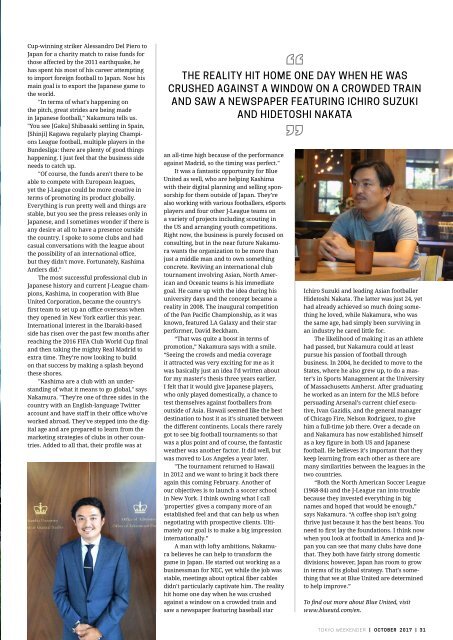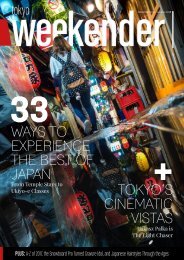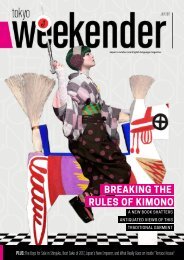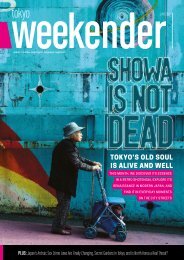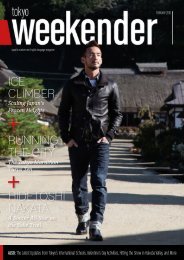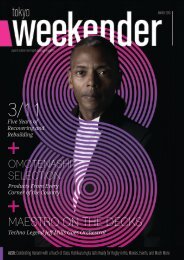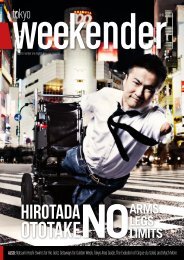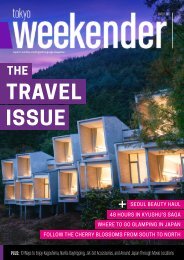Tokyo Weekender - October 2017
A day in the life of a geisha. Find your perfect Kyushu. Plus Q&A with anime director Keiichi Hara, are robots taking our jobs?, Explore Japanese cuisine at GINZA SIX, and Tsukuda guide
A day in the life of a geisha. Find your perfect Kyushu. Plus Q&A with anime director Keiichi Hara, are robots taking our jobs?, Explore Japanese cuisine at GINZA SIX, and Tsukuda guide
You also want an ePaper? Increase the reach of your titles
YUMPU automatically turns print PDFs into web optimized ePapers that Google loves.
Cup-winning striker Alessandro Del Piero to<br />
Japan for a charity match to raise funds for<br />
those affected by the 2011 earthquake, he<br />
has spent his most of his career attempting<br />
to import foreign football to Japan. Now his<br />
main goal is to export the Japanese game to<br />
the world.<br />
"In terms of what's happening on<br />
the pitch, great strides are being made<br />
in Japanese football," Nakamura tells us.<br />
"You see [Gaku] Shibasaki settling in Spain,<br />
[Shinji] Kagawa regularly playing Champions<br />
League football, multiple players in the<br />
Bundesliga: there are plenty of good things<br />
happening. I just feel that the business side<br />
needs to catch up.<br />
"Of course, the funds aren't there to be<br />
able to compete with European leagues,<br />
yet the J-League could be more creative in<br />
terms of promoting its product globally.<br />
Everything is run pretty well and things are<br />
stable, but you see the press releases only in<br />
Japanese, and I sometimes wonder if there is<br />
any desire at all to have a presence outside<br />
the country. I spoke to some clubs and had<br />
casual conversations with the league about<br />
the possibility of an international office,<br />
but they didn't move. Fortunately, Kashima<br />
Antlers did."<br />
The most successful professional club in<br />
Japanese history and current J-League champions,<br />
Kashima, in cooperation with Blue<br />
United Corporation, became the country’s<br />
first team to set up an office overseas when<br />
they opened in New York earlier this year.<br />
International interest in the Ibaraki-based<br />
side has risen over the past few months after<br />
reaching the 2016 FIFA Club World Cup final<br />
and then taking the mighty Real Madrid to<br />
extra time. They’re now looking to build<br />
on that success by making a splash beyond<br />
these shores.<br />
"Kashima are a club with an understanding<br />
of what it means to go global," says<br />
Nakamura. "They're one of three sides in the<br />
country with an English-language Twitter<br />
account and have staff in their office who've<br />
worked abroad. They've stepped into the digital<br />
age and are prepared to learn from the<br />
marketing strategies of clubs in other countries.<br />
Added to all that, their profile was at<br />
THE REALITY HIT HOME ONE DAY WHEN HE WAS<br />
CRUSHED AGAINST A WINDOW ON A CROWDED TRAIN<br />
AND SAW A NEWSPAPER FEATURING ICHIRO SUZUKI<br />
AND HIDETOSHI NAKATA<br />
an all-time high because of the performance<br />
against Madrid, so the timing was perfect."<br />
It was a fantastic opportunity for Blue<br />
United as well, who are helping Kashima<br />
with their digital planning and selling sponsorship<br />
for them outside of Japan. They’re<br />
also working with various footballers, eSports<br />
players and four other J-League teams on<br />
a variety of projects including scouting in<br />
the US and arranging youth competitions.<br />
Right now, the business is purely focused on<br />
consulting, but in the near future Nakamura<br />
wants the organization to be more than<br />
just a middle man and to own something<br />
concrete. Reviving an international club<br />
tournament involving Asian, North American<br />
and Oceanic teams is his immediate<br />
goal. He came up with the idea during his<br />
university days and the concept became a<br />
reality in 2008. The inaugural competition<br />
of the Pan Pacific Championship, as it was<br />
known, featured LA Galaxy and their star<br />
performer, David Beckham.<br />
“That was quite a boost in terms of<br />
promotion,” Nakamura says with a smile.<br />
“Seeing the crowds and media coverage<br />
it attracted was very exciting for me as it<br />
was basically just an idea I'd written about<br />
for my master's thesis three years earlier.<br />
I felt that it would give Japanese players,<br />
who only played domestically, a chance to<br />
test themselves against footballers from<br />
outside of Asia. Hawaii seemed like the best<br />
destination to host it as it's situated between<br />
the different continents. Locals there rarely<br />
got to see big football tournaments so that<br />
was a plus point and of course, the fantastic<br />
weather was another factor. It did well, but<br />
was moved to Los Angeles a year later.<br />
"The tournament returned to Hawaii<br />
in 2012 and we want to bring it back there<br />
again this coming February. Another of<br />
our objectives is to launch a soccer school<br />
in New York. I think owning what I call<br />
'properties' gives a company more of an<br />
established feel and that can help us when<br />
negotiating with prospective clients. Ultimately<br />
our goal is to make a big impression<br />
internationally.”<br />
A man with lofty ambitions, Nakamura<br />
believes he can help to transform the<br />
game in Japan. He started out working as a<br />
businessman for NEC, yet while the job was<br />
stable, meetings about optical fiber cables<br />
didn't particularly captivate him. The reality<br />
hit home one day when he was crushed<br />
against a window on a crowded train and<br />
saw a newspaper featuring baseball star<br />
Ichiro Suzuki and leading Asian footballer<br />
Hidetoshi Nakata. The latter was just 24, yet<br />
had already achieved so much doing something<br />
he loved, while Nakamura, who was<br />
the same age, had simply been surviving in<br />
an industry he cared little for.<br />
The likelihood of making it as an athlete<br />
had passed, but Nakamura could at least<br />
pursue his passion of football through<br />
business. In 2004, he decided to move to the<br />
States, where he also grew up, to do a master’s<br />
in Sports Management at the University<br />
of Massachusetts Amherst. After graduating<br />
he worked as an intern for the MLS before<br />
persuading Arsenal’s current chief executive,<br />
Ivan Gazidis, and the general manager<br />
of Chicago Fire, Nelson Rodriguez, to give<br />
him a full-time job there. Over a decade on<br />
and Nakamura has now established himself<br />
as a key figure in both US and Japanese<br />
football. He believes it’s important that they<br />
keep learning from each other as there are<br />
many similarities between the leagues in the<br />
two countries.<br />
“Both the North American Soccer League<br />
(1968-84) and the J-League ran into trouble<br />
because they invested everything in big<br />
names and hoped that would be enough,”<br />
says Nakamura. “A coffee shop isn’t going<br />
thrive just because it has the best beans. You<br />
need to first lay the foundations. I think now<br />
when you look at football in America and Japan<br />
you can see that many clubs have done<br />
that. They both have fairly strong domestic<br />
divisions; however, Japan has room to grow<br />
in terms of its global strategy. That’s something<br />
that we at Blue United are determined<br />
to help improve.”<br />
To find out more about Blue United, visit<br />
www.blueutd.com/en.<br />
TOKYO WEEKENDER | OCTOBER <strong>2017</strong> | 31


